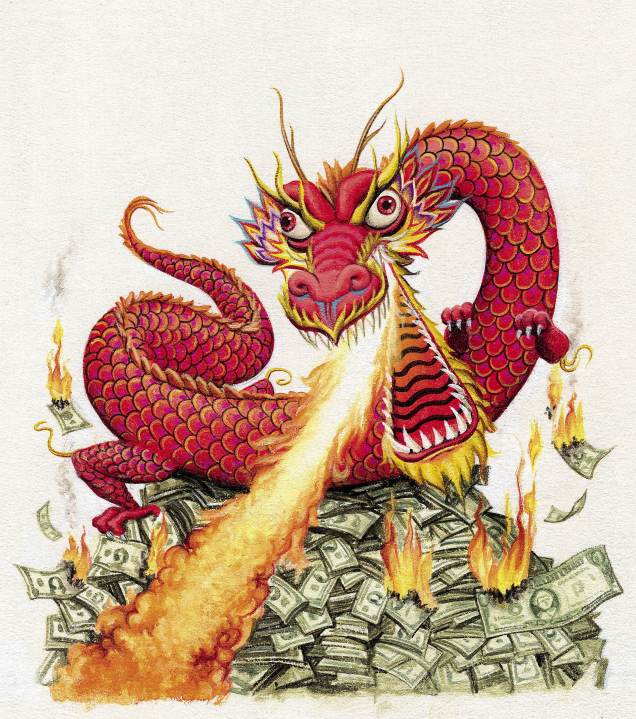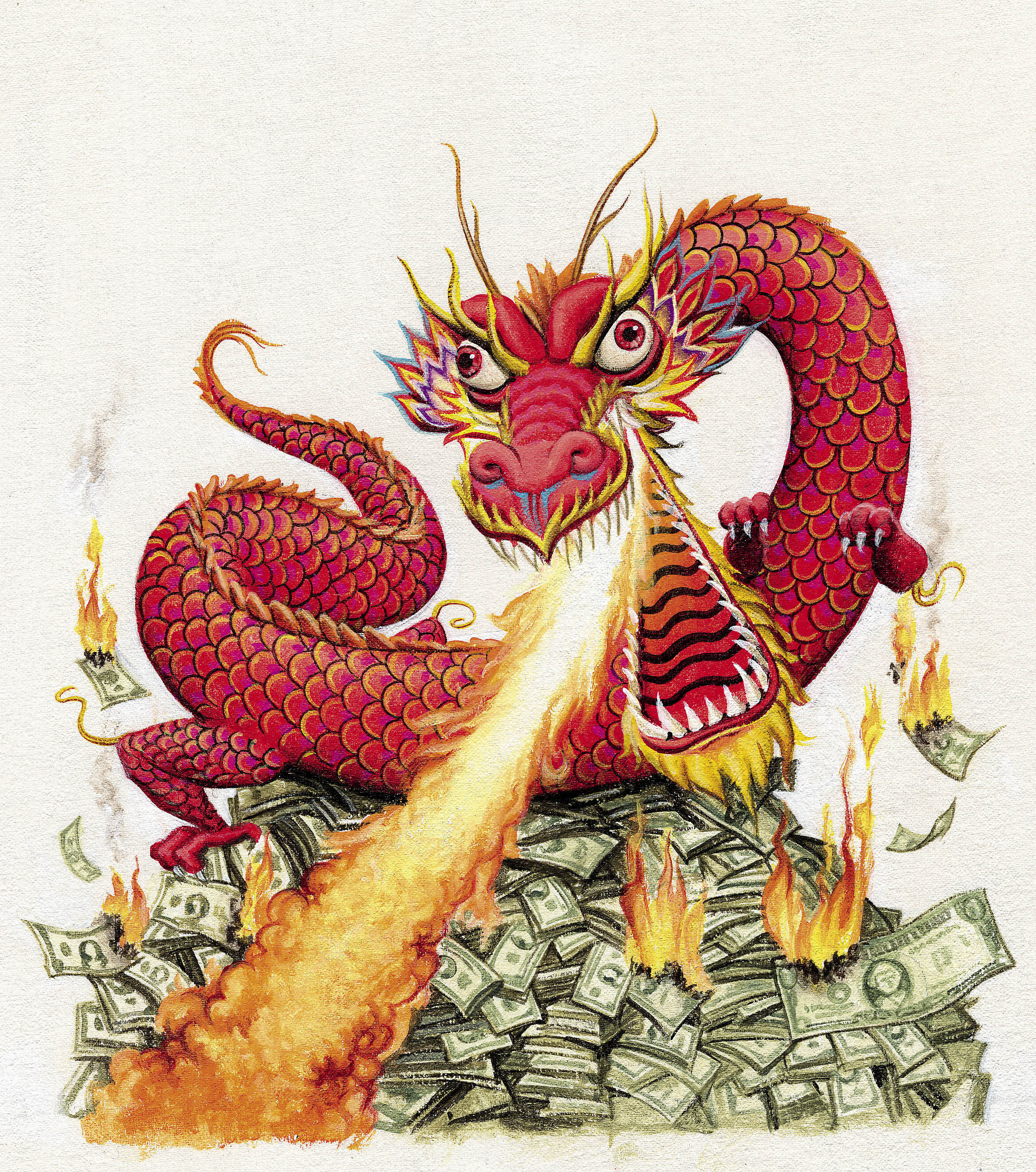In a couple of weeks’ time, David Cameron and George Osborne will arrive in China and witness at first hand an economic boom that is shaking the world. The British duo will doubtless receive a polite and outwardly respectful reception. But, as I discovered on a visit to Shanghai last week, Chinese diplomats and academics have noted the deep cuts in British spending — and they are drawing the obvious conclusions about the relative fortunes of the two nations. As one of my colleagues in China put it to me, ‘Nobody spots blood in the water faster than the Chinese.’
The contrast between the boom in China and the gloom in Britain is part of a bigger story of the shift in economic and political power from the West to the East. Two years after the global financial crisis, the United States and Europe are still in deep economic trouble, while the economic surge in Asia has resumed. That change is reflected in the announcement this week that seats and voting weights on the board of the International Monetary Fund will be adjusted, with Europe losing influence and emerging nations such as China and India gaining power. In the US, unemployment is 9.6 per cent. In China, 9.6 per cent is the annual growth figure.
The palpable change in the relative fortunes of East and West is more than an economic story. It is changing the global balance of power and the way in which the world’s most powerful countries treat each other. After a long period of co-operation, rivalries between the major powers are rising again. At the centre of this increase in international tensions is the deterioration in the relationship between the US and China — the world’s largest and second largest economies. (China officially overtook Japan to become the world’s second largest economy a couple of months ago.)
In the 20 years after the end of the cold war, the world’s major powers all embraced globalisation — a system that seemed to promise rising living standards for everybody. But globalisation was about a lot more than economics. It also had profound political implications, because it created common interests between the biggest countries in the world, as they all experienced an economic surge fuelled by rising international trade and investment. In the Clinton years, America enjoyed its technology boom and its longest peacetime growth since the second world war. The European Union was in confident mood, launching the euro and more than doubling in size. Countries like Brazil and India began to be taken seriously as global economic and political powers. Above all, China’s relentless rise continued — even after the shock of the 1989 Tiananmen Square massacre (or ‘incident’ as my Chinese hosts preferred to call it).
But the economic crash of 2008 has changed the logic of international relations. In China, they still insist that globalisation has created a ‘win-win’ world that benefits all countries. But the Americans are clearly beginning to have their doubts. They are increasingly seeing the world in zero-sum terms — and worrying that a richer and more powerful China will mean a poorer and weaker United States.
I got a sense of this change in mood towards China on a recent trip to the US to report on the mid-term elections. Las Vegas more than matches Shanghai when it comes to neon lighting. But the economic mood in the two cities could not be more different. The state of Nevada is America’s foreclosure capital and its unemployment is the highest in the nation. At a rally for Sharron Angle, the Tea-Party-backed Republican candidate who seems likely to unseat Harry Reid, the Democrats’ leader in the Senate, most of the voters’ anger was directed towards the ‘socialist’ President Obama. But China came a close second as a bogeyman. I was told several times that China had a long-term plot to undermine and take over the United States.
Suspicion of China is not confined to a populist fringe of tea-drinking ‘know-nothings’. Perhaps more dangerously for the Chinese, mainstream American economists — some of whom led the cheerleading for globalisation over the past decade — have begun to argue vociferously that America’s economic difficulties and high unemployment have a lot do with Chinese protectionism, expressed through an artificially undervalued currency. Among those who have argued that tariffs would be a justified response to China’s currency policy are Paul Krugman, the Nobel Prize-winning economist and New York Times columnist, and Fred Bergsten, director of the influential Peterson Institute for International Economics.
These arguments have found an increasingly receptive audience in Congress. Just before the mid-term elections, the House of Representatives passed a bill that would allow America to impose tariffs on China, in response to its manipulation of the currency. The Senate is likely to pass a similar bill in the next few months. Then it will be up to President Obama whether to sign it. In the current political and economic mood in the US, he may well choose to do just that. At that point, the logic of a trade war would set in.
The Chinese are already contemplating what retaliatory measures they might take. The real hotheads talk of dumping American Treasury bonds (China owns close to $1 trillion worth) — although since that might cause a collapse in the value of the dollar, it would also damage the value of Chinese assets. China is also experimenting with restricting the exports of ‘rare earth’ minerals, in which it enjoys a virtual monopoly — and which are used in the manufacture of such American essentials as the iPhone. The markets are already reflecting this threat with a bubble-like surge in the price of the small mining companies that have access to rare-earths.
The rise in economic tensions between China and America is matched by an increasingly tense military and strategic situation. America is the dominant military power in the Pacific, but China is rapidly increasing its military spending. In China last week, I was informed by a senior Chinese official that his country would soon announce the construction of its first aircraft carrier — and that eventually it would aim to have four or five. (And unlike the British carriers, the Chinese ones would have actual planes on them.) The US has 11 carrier battle-groups. But the Americans have global responsibilities and Robert Gates, the US defence secretary, has already acknowledged the need for cuts as America struggles to control its huge budget deficit.
The balance of power in the Pacific is being closely watched by China’s increasingly nervous neighbours. In recent weeks, China and Japan have clashed over their rival claims to islands in the oceans that lie between them. Southeast Asian nations, several of which also have territorial disputes with China in the South China Sea, have been alarmed by China’s announcement this year that it regards the area as a ‘core national interest’. The Southeast Asians have urged the Americans to re-assert their military presence in the area. India also has outstanding territorial disputes with China — and Indian diplomats are complaining to all who will listen that China is reviving its long-dormant claim to the Indian state of Arunachal Pradesh, which China refers to as southern Tibet.
In his first couple of years in office, President Obama sought to construct a much warmer relationship with China. But the tone of American-Chinese relations is changing. The Chinese were shocked recently when Hillary Clinton asserted that the US has a national interest in the territorial disputes in the South China Sea. In November, President Obama will visit India — and China’s regional ambitions are sure to be on the agenda, while major new American arms sales to India may be announced.
Europeans may hope that they can simply watch these events unfold as interested bystanders. But they will inevitably be caught up by the way in which zero-sum logic is infecting international relations. Britain has put the maintenance of an open global economic system right at the centre of the new national security strategy which it announced last week, as a background to the defence cuts. But a US-China trade war would strike a blow to the very heart of the globalised trading system.
Deteriorating Chinese-American relations are also beginning to infect international efforts to handle a range of global problems from climate change to nuclear proliferation and failing states. The parlous state of international co-operation is likely to be vividly illustrated over the next couple of months at two big international summits. The G-20 meeting in Seoul in November threatens to degenerate into an open row between China and America over trade and currency — as the rest of the world frets about a round of competitive devaluation from Brazil to Thailand. The following month will see a renewed effort to revive global climate-change talks in Cancun. But after the debacle of the Copenhagen summit last year, where American-Chinese tensions were central to the failure, few can be hopeful that Cancun will be any more successful.
Over the past 20 years, many in the West hoped that globalisation had repealed one of the oldest rules of international politics — that rising nations eventually clash with established powers. This optimism is beginning to fade. Over the next decade, global leaders will need luck, judgment and wisdom to manage the tensions between a rising China and an increasingly troubled United States.
Gideon Rachman is chief foreign affairs commentator of the Financial Times. His new book, Zero-Sum World, is published by Atlantic Books on 1 November.






Comments